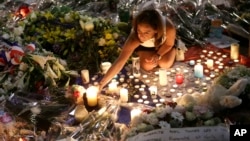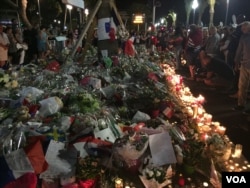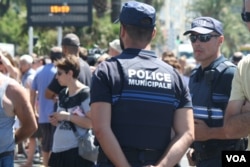First, came the shock and grief. Then the bouquets piled on makeshift shrines; the lines in front of blood banks; the rallies against terrorism drawing tens of thousands. And, of course, the spectacular, if brief, lift in the polls for France's unpopular president, Francois Hollande.
That was then.
Now there is Nice, where the public reaction to the Bastille Day rampage is very different from last year’s Paris attacks. Instead of solidarity, accusations are flying over the leftist government’s failure to prevent a third terrorist strike in just 18 months. The mood on the streets is sullen and fearful. And less than a year before French elections, security — along with jobs and growth — is emerging as a top campaign theme.
“For the moment, the discussion is about the security response,” said Jerome Sainte-Marie, head of the Paris-based opinion agency PollingVox. “But bit by bit, the subject is going to be politicized. People will start talking about immigration, Islam — and especially Europe.”
While French prosecutors said Monday that the Tunisian assailant Mohamed Lahoualej Bouhlel ate pork, drank and had an "unbridled" sex life, evidence also points to jihadi contacts and a recent, rapid conversion to militant Islam.
The Islamic State group has claimed responsibility for the attacks, though Bouhlel had no history of radical activities, authorities say, only of petty crime.
Security is also emerging as a top concern across the European Union — one Hollande is expected to push this week during trips to Portugal and Ireland to reenergize the block after the Brexit vote. While visits to three other European capitals have been cancelled after Nice, some see the attacks actually strengthening Hollande’s European hand.
“Security of citizens and of the European Union is probably the value today most shared from Paris to Warsaw, including Germany,” France’s Les Echos newspaper wrote.
Analyst Sainte-Marie is less optimistic.
“It reinforces the perception that it’s another area where Hollande has failed,” he said.
‘Government cannot protect us’
The sense of mounting frustration was tangible on Monday, as French marked a minute of silence for those Bouhlel mowed down as he careened down Nice’s seafront esplanade last week.
“Murderers!” hecklers shouted to Prime Minister Manuel Valls as he joined the gathering in Nice. “Resign!”
An IFOP poll taken a day after the attack finds 67 percent of those surveyed have no confidence in the government’s ability to fight terrorism.
“It’s really difficult to anticipate how opinion will evolve,” IFOP General Director Frederic Dabi told Agence France-Presse. Hollande and his government may yet get a post-attack bounce, he added, or the public may conclude “this government cannot protect us.”
Hollande’s political opponents are not waiting for the fallout.
“I know that we should not fight and tear each other apart when the victims aren’t yet buried,” former president Nicolas Sarkozy, who is eyeing another run next year, told French TV. “But everything that should have been done over the past 18 months was not done.”
Another presidential hopeful, former Prime Minister Alain Juppe, offered similar words.
“If everything had been done, this attack would not have happened,” he concluded.
For her part, far right, anti-immigration leader Marine Le Pen has called on French Interior Minister Bernard Cazeneuve to resign.
“In any other country, a minister with a record as disgraceful as Bernard Cazeneuve’s — 250 dead in 18 months — would have stepped down a long time ago,” she said.
Measures French authorities have taken are controversial. Rights groups have raised alarm over abuses under the state of emergency imposed after November’s attacks — even as a parliamentary probe concluded the emergency measures made little impact in fighting terrorism.
“How many dead and wounded, how many ravaged families, how many distressed French and stunned allies before our authorities pull themselves together — assuming that’s even possible?” Francois Heisbourg, a leading security analyst, asked in a commentary in Le Monde newspaper.
Criticism ‘totally unjust’
Authorities are scrambling for a riposte — and scrambling to prepare the public for a long slog ahead.
“Until now, no government has done as much to fight terrorism,” Interior Minister Cazeneuve and Prime Minister Manuel Valls said in a joint statement Sunday, with Valls later saying the government had deflected an attack during this month's Euro cup. “The government is totally determined to continue and to increase this action.”
Some French agree. “It’s impossible to foresee this kind of terrorism — except to ban all cars and trucks and keep people at home,” said Parisian Maryse Pinheiro, a longtime leftist supporter. “The criticism against the government is totally unjust.”
Yet perhaps style counts as much as substance. Analyst Sainte-Marie of PollingVox points to conflicting signals Hollande has sent in recent days — first announcing the state of emergency would be lifted later this month, only to call after the Bastille killings for its extension.
“It gives the impression of a president overwhelmed by events, who has lost control of them,” Sainte-Marie said.











